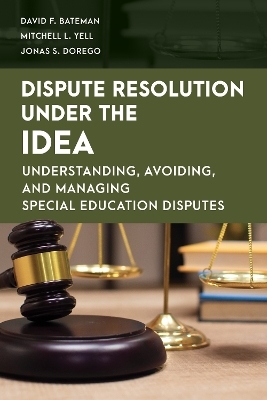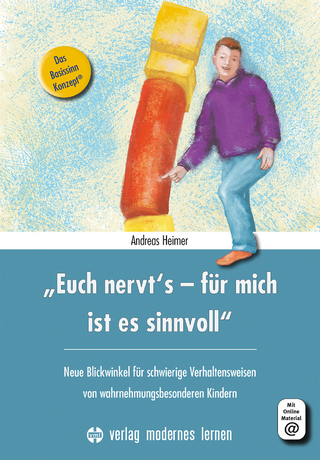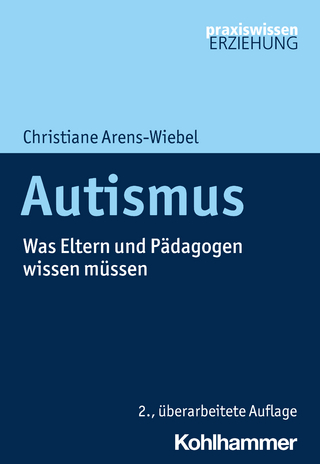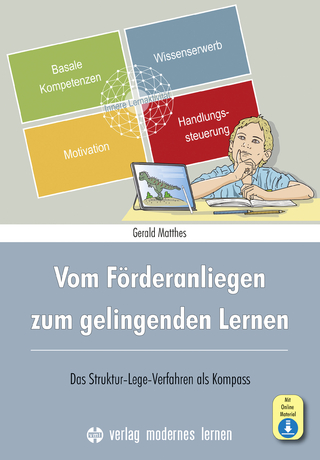
Dispute Resolution Under the IDEA
Rowman & Littlefield (Verlag)
978-1-5381-5616-2 (ISBN)
This one-of-a-kind, comprehensive resource provides all the information necessary both to avoid and to prepare for special education disputes. This book ensures that all parties receive the necessary information prior to proceeding to complaints, mediations, or hearings. While incorrect or inadequate information can lead to an inappropriate education for students with disabilities, correct information can enhance the education of students with disabilities and help to ensure the legal mandates guaranteed by the federal law.
To avoid dispute resolution, it is critically important that education personnel understand how to ensure compliance with significant aspects of the Individuals with Disabilities Education Act. Administrators and teachers must know (a) how to prepare for a state complaint investigation, mediations, and due process hearings, (b) what is involved and what is expected in each, and (c) what happens at the conclusion of the complaint investigation, mediation, or due process hearing.
Written for all parties—special education administrators, principals, building administrators, teachers, and parents—this resource provides information about the dispute resolution systems: what is involved, how to prepare, the conduct of the complaint investigations, mediations, and due process hearings. Notably, the authors discuss how disputes can be avoided, but also when they occur, how school staff can to continue to work with productively with parents after the complaint or hearing.
Mitchell L. Yell, PhD, is the Fred and Francis Lester Palmetto Chair in Teacher Education and a Professor in Special Education at the University of South Carolina. His professional interests include special education law, IEP development, progress monitoring, and parent involvement in special education. Dr. Yell has published 136 journal articles, 6 textbooks, 36 book chapters, and has conducted numerous workshops on various aspects of special education law, classroom management, and progress monitoring. His textbook, Special Education and the Law, is in its 5th edition. He co-authored the text Developing Educationally Meaningful and Legally Sound IEPs. Dr. Bateman and Dr. Yell are the editors of the Special Education Law, Policy, and Practice series published by Rowman & Littlefield. In 2020, he was awarded the Researcher of the Year from the Council for Exceptional Children. Dr. Yell also serves as a State-level due process review officer (SRO) in South Carolina and is on the Board of Directors of the Council for Exceptional Children. Prior to working in higher education, Dr. Yell was a special education teacher in Minnesota for 12 years. David F. Bateman, PhD, is a professor at Shippensburg University in the Department of Educational Leadership and Special Education where he teaches courses on special education law, assessment, and facilitating inclusion. He is also a senior consultant at the American Institutes for Research. He is a former due process hearing officer for Pennsylvania where is was involved with 580 hearings. He uses his knowledge of litigation relating to special education to assist school districts in providing appropriate supports for students with disabilities. His latest area of research has been on the role of principals in special education. He has been a classroom teacher of students with learning disabilities, behavior disorders, intellectual disability, and hearing impairments, and a building administrator for summer programs. He has recently co-authored the following books: A Principal’s Guide to Special Education, A Teacher’s Guide to Special Education, Charting the Course: Special Education in Charter Schools, Current Trends and Legal Issues in Special Education, and Developing Educationally Meaningful and Legally Sound IEPs. Drs. Yell and Bateman are the editors of the Special Education Law, Policy, and Practice series published by Rowman & Littlefield. Jonas Dorego, Med, is a retired Compliance Officer for the Guam Department of Education. Ms. Dorego has worked as a compliance officer for the last 20 years managing the Guam Department of Education’s General Supervision System, including managing special education disputes. Her experience includes providing direct technical assistance to school teams on how to develop legally defensible IEPs, preparing school administrators on how to avoid special education disputes with parents, assisting the DOE on how to resolve disputes without going to hearing, preparing school teams to prepare for the actual hearing, and how to implement hearing outcomes.
Introduction
Chapter 1: An Overview of the Individuals with Disabilities Education Act and Dispute Resolution
Advance Organizers
The Legal Development of Special Education
The Courts and Special Education
Pennsylvania Association for Retarded Citizens v. Pennsylvania (1972)
Mills v. Board of Education (1972)
Congress and Special Education
Education for All Handicapped Children Act of 1975 (EAHCA)
Primary Components of the IDEA
Free Appropriate Public Education
Evaluation
Least Restrictive Environment
Procedural Safeguards
What is the Dispute Resolution System of the IDEA?
Conclusion
References
Chapter 2: Avoiding Dispute Resolution
Advance Organizers
The Critical Importance of a Good Parent-School Partnership
Factors that Contribute to Establishing Meaningful Parent-School Partnerships in Special Education
Communication
Be Friendly
Listen
Be Clear
Be Honest
Provide and Coordinate Information
Commitment
Equality
Skills
Trust
Respect
Summary: Factors that Contribute to Establishing Meaningful Parent-School Partnerships in Special Education
Factors that Contribute to Parent-School Conflicts in Special Education
Strategy #1: Provide Training to Administrators and Teachers on Conflict Resolution Procedures
Strategy #2: Recognize Situations that Lead to Parent-School Conflicts
Discrepant View of a Child or a Child’s Needs
Lack of Problem-Solving Knowledge
Service Delivery
Constraints on Resources
Devaluation of the Parent-School Partnership
Reciprocal Power
Trust and Communication
Summary: Factors that Contribute to Parent-School Conflicts in Special Education
Alternative Dispute Resolution Mechanisms
Strategy #1: Be Prepared for Possible Contentions IEP Meetings
Strategy #2: Listen Carefully and Be Willing to Resolve the Dispute
Strategy #3: Use an Ombudsperson
Strategy #4: Use IEP Facilitation
Summary: Alternative Dispute Resolution Mechanisms
Conclusion
References
Chapter 3: State Complaints
Advance Organizers
Why are States Required to Development and Implement Complaint Procedures?
What is a State Complaint?
Who May File a State Complaint?
The Advantages of Filing a State Complaint
Tips on Completing a State Complaint
The SEA Complaint Resolution Process
Differences Between a State Complaint and a Due Process Hearing
Conclusion
References
Chapter 4: Mediation
Advance Organizers
What is Mediation?
Mediation as a Process
Why Choose Mediation?
Step One: The Beginning of a Mediation Session
Step Two: The Specifics of the Issue Being Mediated
Step Three: Conduct the Mediation Session
Preparation for Mediation
First: Focus on Purpose
Second: Clarify the Issues
Third: Develop an Index of Documents
Fourth: Develop a Summary
Fifth: State Your Issues
Sixth: Plan Sufficient Time for the Process
Seventh: Attendees at the Mediation
Eighth: Review the Procedural Safeguards
Ninth: Focus on Your Goals
What Makes for an Effective Mediation?
Mediation Agreements
Conclusion
References
Chapter 5: The Resolution Meeting
Advance Organizers
Resolution Meetings
The Courts and Resolution Meeting
Participants in the Resolution Meeting
Reaching a Resolution Agreement
Benefits of Resolution Meetings
Preparing for a Resolution Meeting
Conclusion
References
Chapter 6: Settlement Agreements
Advance Organizers
The Purpose of a Settlement Agreement
Settlement Agreements and Mediation
Settlement Agreements and Resolution Meetings
The Contents of a Settlement Agreement
Enforcement of Settlement Agreements
Conclusion
References
Chapter 7: Due Process Hearings
Advance Organizers
Due Process Hearings
One Tier and Two Tier Due Process Hearing Systems
What Is Meant by Special Education Due Process?
The Qualifications and Independence of the Hearing Officer
Procedural and Substantive Issues
Who May Request a Due Process Hearing?
Timeline of a Due Process Hearing
Notice of a Due Process Hearing
Sufficiency Challenge
Amended Due Process Hearing Complaint
Preliminary Meetings/Prehearing Due Process Hearing Conference
Prehearing Subject Matter
Disclosure of Exhibits, Witness List, and Introduction of Evidence
Stay-Put Rule
Due Process Hearing Basics
The Conduct of the Due Process Hearing
The Burden of Proof in a Due Process Hearing
Hearing Officers’ Ruling
Civil Action
Conclusion
References
Chapter 8: What to Expect in a Due Process Hearing
Advance Organizers
Before the Hearing
Location
The Actual Hearing
Stipulations
Opening Statements
Presentation of Witnesses
Sequestration
Witness Offer
Expert Testimony
Exhibits
Expedited Hearings
Closing Statement
Written Closing Statements
Hearing Officer Ruling
Appeal
Implementing the Decision
Conclusion
Chapter 9: Expert Testimony
Advance Organizers
Ethical Considerations
Expert Testimony and the Law
What is an Expert Witness?
Conflicting Experts
Special Education Expert Witness and the Supreme Court
Position on Expert Witness Feed of the Council of Parent Attorneys and Advocates
Expert Witness v. Lay Witness
Testifying as an Expert Witness
Scheduling Issues
Mutually Agreed Upon Experts
Conclusion
References
Chapter 10: Witness Preparation for a Due Process Hearing
Advance Organizers
The Basics of Testimony
Direct Examination
Cross-Examination
Preparing Witnesses for Testifying
The Importance of Thorough Preparation
The Process of Testifying
What to Take to the Witness Seat?
Making an Impression
Conclusion
References
Chapter 11: School District Preparation for Due Process Hearings
Advance Organizers
Prevention
The Due Process Hearing Complaint
Preparing for a Due Process Hearing
Notifying and Interviewing Personnel who may be Involved in the Hearing
Superintendent of the School District
Attorney for the School District
Insurance Carrier for the School District
Principals, Teachers, and Others who may be Involved
Gathering Relevant Documents
Anecdotal Notes
Emails and Correspondence
After a Hearing
Reviewing the Hearing Officer’s Order
Addressing Staff Morale
Addressing Inappropriate Actions by School Personnel
Providing Staff Development
Rebuilding Relationships with Parents
Adjusting Policies and Procedures
Conclusion
References
Chapter 12: Parent Preparation for a Due Process Hearing
Advance Organizers
Why Parents File Due Process Complaints
Strategies for Improving Collaboration
Strategy #1: Stay Child-Centered
Strategy #2: Treat Others Respectfully
Strategy #3: Meet Face-to-Face
Strategy #4: Contact the Correct School District Personnel
Strategy #5: Identify the Primary Issue
Strategy #6: Do Your Research
Strategy #7: Have Follow-Up Meetings
Deciding to Request a Due Process Hearing
Pre-Hearing Request Steps
Step One: Identify the Issue
Step Two: Consider the Outcome
Step Three: Gather and Organize All of the Files
Step Four: Review the Files
Step Five: Organize
Step Six: Table of Contents
Step Seven: Review Your Documents
Deciding on Hiring an Attorney
Choosing an Attorney
Pro Se Representation
Positive Aspects of Proceeding Pro Se
Negative Aspects of Proceeding Pro Se
Additional Advice for Parents
Filing a Due Process Complaint
Consider Settling the Dispute
Participating in a Due Process Hearing
Conclusion
References
Chapter 13: How to Read a Due Process Hearing Decision
Advance Organizers
What is a Decision?
How to Read a Decision
Part One: Cover Page
Part Two: Executive Summary
Part Three: The Issues in the Case
Part Four: The Facts of the Case
Part Five: Discussion and Conclusion of Law
Part Six: The Hearing Officer’s Order
What Happens After the Decision?
Conclusion
Chapter 14: After a Due Process Hearing
Advance Organizers
The Relief that a Hearing Officer May Order
Appealing a Due Process Hearing Decision
Should There Be an Appeal?
Appealing a Hearing Officer’s Decision
The Appeals Process
Information in an Appeal of a Hearing
Appellate Briefs
The Transcript of the Due Process Hearing
After Appealing a Court Decision
Learning from a Due Process Hearing or State Complaint
Plane v. Car Crash Analogy
Opportunities to Learn from Due Process Hearings and State Complaints
Expenses to be Weighed
Conclusion
References
Appendix A: Settlement and Release Agreement
Appendix B: Due Process Hearing Decision
Appendix C: Letter from a Hearing Officer to Parent
Appendix D: Opening Statement of Hearing Officer
Appendix E: Glossary of Legal Terms for Hearings
References
Index
About the Authors
| Erscheinungsdatum | 24.02.2023 |
|---|---|
| Reihe/Serie | Special Education Law, Policy, and Practice |
| Verlagsort | Lanham, MD |
| Sprache | englisch |
| Maße | 155 x 223 mm |
| Gewicht | 408 g |
| Themenwelt | Sozialwissenschaften ► Pädagogik ► Sonder-, Heil- und Förderpädagogik |
| Sozialwissenschaften ► Pädagogik ► Vorschulpädagogik | |
| ISBN-10 | 1-5381-5616-4 / 1538156164 |
| ISBN-13 | 978-1-5381-5616-2 / 9781538156162 |
| Zustand | Neuware |
| Informationen gemäß Produktsicherheitsverordnung (GPSR) | |
| Haben Sie eine Frage zum Produkt? |
aus dem Bereich


